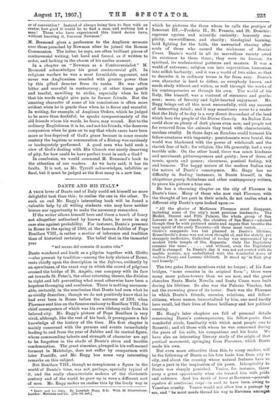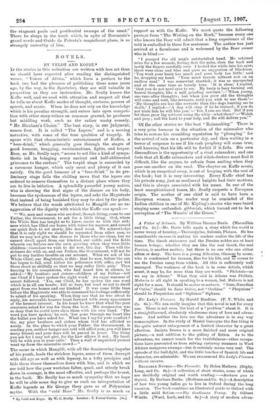DANTE AND HIS ITALY.*
A TRUE lover of Dante and of Italy could set himself no more delightful task than this : to realise the one in the other. To . such an end Mr. Ragg's interesting book will be -.found • a , valuable help by all willing students who may have neither leisure nor opportunity to make the necessary researches. If the writer allows himself here and there a touch of fancy not altogether authorised by known facts, he never. in . any case sins against probability. For instance, Dante's presence in Rome in the spring of 1300, at the famous Jubilee of Pope Boniface VIII., is rather a matter of inference and tradition than of historical certainty. The belief that in the immortal
year . •
"nel mezzo del cammin di nostra vita" Dante wandered -and knelt as a pilgrim together with Giotto —also present by tradition—among the holy shrines of Rome, rests-chiefly upon the description in the Inferno, evidently by an eyewitness. of the exact way in which the crowd of pilgrims crossed the bridge of St. Angelo, one company with its face set towards St. Peter's, the other returning thence, the division to right and left preventing what must otherwise have been a hopeless thronging and confusion. There is nothing unreason- able, certainly, in the conclusion that Dante had seen what he so vividly describes; though we do not positively know that he had ever been in Rome before the autumn of 1301, when Florence sent him on the famous embassy to Boniface VIII., the chief consequence of which was his own lifelong exile from his beloved city. Mr. Ragg's picture of Pope Boniface is very . vivid, although, like the rest of his book, it presupposes a fair knowledge of the history of the time. His first chapter is mainly concerned with the persons and events immediately leading to and from the year of Jubilee and its central figure, • . whose commanding talents and strength of character are apt to -be forgotten in the shade of Dante's stern and terrible -condemnation. The great simoniac, plunged in his well-earned . torment in Malebolge, • does not suffer by comparison with later Pontiffs, and Mr. Ragg has some very interesting . remarks on this subject.
But Boniface VIII., though so-conspicuous a figure in the world'of Dante's time, was not, perhaps, specially typical of • and- the really characteristic makers of the thirteenth century and of the world be grew, up in were a different sort of. men. Mr. Ragg makes us realise this by the lively way-in • Dante and las Italy. By Lonsdaie Eagg, B.D. With 92 Illustrations. London: Methuen and Co. [12s. 6d. net.] which he pictures the three whom .he calls the proteges of Innocent III.,—Frederic II., St. Francis, and St. Dominic : supreme egoism and scientific curiosity ; heavenly sim- plicity, unworldliness, and charity ; theological learning, bold fighting for the faith, the unwearied chasing after souls of those who earned the nickname of Domini Canes. Da.ute's world in all its marvellous variety owed its existence to these three ; they were its human, its spiritual, its ecclesiastical patterns and masters. It was world of extremes; religion ran into superstition, humanism into selfish barbarity; and it was a world of two sides, so that to describe it in ordinary terms is far from easy. Dante's own character is bard to define, as everybody knows, and needs study without and within, as well through the works of his contemporaries as through his own. The world of his Italy, like himself, was a contrast of sternness and gentle- ness ; more, of ferocity and light-hearted enjoyment.. Mr. Ragg brings out all this most successfully, with any amount of interesting detail ; and it may sometimes occur to a reader that the Italy of to-day is a very direct descendant of the land which bore the people of the Divine Comedy. An Italian Zola could show us plenty of dark places even now, and people not far removed from the animals they treat with characteristic, careless cruelty. In those days an Ezzelino could torment his fellow-creatures with impunity.; punishments were brutal, the
world was blackened with the power of witchcraft and the slavish fear of hell ; for religion, like life generally, had a very terrible side. On the other hand, there was much kindness and merriment, picturesqueness and gaiety; love of dress, of music, sports and games; cleverness, poetical feeling, wit and humour. The happy nature of the modern Italian was the nature of Dante's countrymen. Mr. Ragg has no difficulty in finding instances, in Dante himself, in the ubiquitous gossip Salimbene and other contemporary writers, to prove his picture a true one.
He has a charming chapter on the city of Florence in Dante's time. Many of those who now visit Florence, with the thought of her poet in their minds, do not realise what a different city Dante's eyes looked upon :- " All the glories of Medicean Florence must disappear, including some of the city's most precious landmarks. The Medici, Strozzi and Pitti Palaces, the whole group of San Lorenzo as it now stands, the cloisters of San Marco—adorned though they be with pictured saints and angels that breathe the very spirit of the early Trecento—all these must vanish •
Giotto 's campanile was but planned in Dante's lifetime, Brunelleschi's dome was not even thought of, and the stately, yet strangely ineffective, Cathedral of to-day was represented by a modest little temple of Sta. R,eparata. Only the Baptistery
remains the same and without, even the Baptistery itself is changed. In Dante's day it was not yet coated with its marble vesture, nor embellished with the wonderful doors of Andrea Pisano and Lorenzo Ghiberti. It stood up `in flint, grey and homely."
The two gates Dante mentions exist no longer ; of his four bridges, "none remains in its original form" ; there were many more palace-towers than we see now, and the great churches Santa Maria Novella and Santa Croce were built during his lifetime. So also was the Palazzo Vecchio, but not the crowning grace of its tower. Such was the Florence in which Dante's friends, enemies, relations, and fellow- citizens, whose names, immortalised by him, one need hardly here recall, led their lives of fierce brilliancy and low political cunning.
Mr. Ragg's later chapters are full of personal details concerning Dante's contemporaries, his fellowToets, that
wonderful circle, familiarity with which most people owe to Rossetti ; and all those with whom he was concerned during the years of his exile, his companions and his hosts. We have also an interesting literary study of the origin of that poetical movement, springing from Provence, which Dante
made his own.
But even more attractive than this, to many readers, will be the following of Dante as his fate leads him from city to city, and about the country whose natural features have so large a part in the inspiration of his poem. Inhospitality to Dante was sharply punished. Venice, for instance, threw
away a great opportunity when she treated him with pride and coldness. And his death of .fever at Ravenna—generale sepolero di santissimi. corpi—is said..to have been- owing to Venetian cruelty. Venice would not allow him a passage by sea, and " he must needs thread his way to Ravenna amongst
the stagnant pools and pestilential swamps of the coast." There be sleeps in the tomb which, in spite of Boccaccio's grand words and Guido da Polenta's magnificent plans, is so strangely unworthy of him.



































 Previous page
Previous page